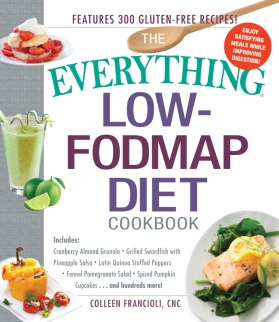Ughhh…being bloated, distended or constipated (pardon my French) sucks! You may be sitting somewhere right now (at work, in your car, about to get on a plane, at dinner, at an event), feeling like you can’t get out of the way from your bloated self (and you wore your slightly tight jeans/pants today with a button that’s pressing into your abdomen *facepalm*)!

The distention and pain is annoying and fills you with anxiety. It’s hard to put on a happy face when you feel so sick and sluggish.
Irritable Bowel Syndrome (IBS) can be visible (bloating, distention) or invisible (abdominal pain, diarrhea, fatigue, depression, hopelessness). I wish there was more awareness around IBS so people like you and me could just have friends, family and co-workers that understand. Maybe someday we can all help to grow awareness to a point where IBS is more understood and accepted as something REAL and not interpreted as something in our heads….for now, let’s focus on you.
While the low-FODMAP diet is a great dietary approach to help relieve symptoms of IBS, sometimes we need a little more than diet to help.
When you’re having stressful IBS moments, there might be other things you can do. I’ve listed some recommendations below for products you can try.
Please note that everything I’ve listed below is purely for educational purposes and it is best to discuss most of them (like supplements) with your physician.
*Remember, at the present time there is no cure for IBS, and no magical pill to take care of your symptoms, but there is hope through alternative means.
*Typically when someone is following the low-FODMAP diet, a FODMAP-trained nutritionist will suggest not taking any supplements so as to receive a more accurate indication of possible triggers of IBS. If before or after you have tried the low-FODMAP diet and want to try the products below, all supplements listed appear to be low in FODMAPs due to the ingredients used (no lactose, wheat, or FODMAPs such as fructooligosaccharides).
Psyllium Husk:
Several products are available to help with constipation and diarrhea but many are made with FODMAPs or ingredients you may not necessarily need. When in doubt, use products that have the least amount of ingredients and go natural! I personally use psyllium husk to help with constipation and it can also be used to help with diarrhea. It can also help with hemorrhoids and IBD. Dr. Kevin Curran, founder of EthnoHerbalist goes into more detail about the benefits of psyllium husk. Please read his article here. Dr. Curran holds a PhD in molecular biology and currently serves as a professor at the University of San Diego, teaching courses on Cell Biology and Ethnobotany.
- Organic India Whole Husk Psyllium, 12-Ounce – I like this brand and I add it to smoothies, lactose-free yogurt, gluten-free and low-FODMAP cereal.
- Learn more from the University of Maryland Medical Center about other uses, precautions and possible interactions.
Peppermint Enteric-Coated Capsules:
Another natural option to help with symptoms of IBS, I have found peppermint enteric-coated capsules to be helpful when I feel bloated like a Macy’s Day Parade balloon! On their own, peppermint enteric-coated capsules don’t completely relieve me, but they do help. They may work for you – just remember, we are all different and every gut is different in the way it responds or reacts to supplements, food, stress, the environment and therapy.
Peppermint has been shown to be a calcium channel blocker of muscle. What that means is peppermint has the ability to block calcium shifts within muscle cells, enabling muscles to relax.
 As reported in the New York Times Well Blog: “In a report financed by the American College of Gastroenterology and published in the journal BMJ in 2008, scientists conducted an analysis of previous studies comparing peppermint oil with placebo in about 400 patients. Ultimately, they found that only 26 percent of patients treated with peppermint oil — typically administered twice daily in capsule form, for a period of one to three months — continued to show symptoms of I.B.S. after treatment, compared with 65 percent of those who were given placebo. The scientists concluded that the evidence was compelling enough that more studies should be conducted, and that in the interim, ‘current national guidelines for the management of the condition should be updated to include these data.'”
As reported in the New York Times Well Blog: “In a report financed by the American College of Gastroenterology and published in the journal BMJ in 2008, scientists conducted an analysis of previous studies comparing peppermint oil with placebo in about 400 patients. Ultimately, they found that only 26 percent of patients treated with peppermint oil — typically administered twice daily in capsule form, for a period of one to three months — continued to show symptoms of I.B.S. after treatment, compared with 65 percent of those who were given placebo. The scientists concluded that the evidence was compelling enough that more studies should be conducted, and that in the interim, ‘current national guidelines for the management of the condition should be updated to include these data.'”
- Nature’s Way Pepogest Peppermint Oil — 60 Softgels
(no wheat, sugar, sodium, lactose or yeast) To be used in small doses, and in coated-capsule form, to reduce any possible heartburn.
Tea:
Any organic Peppermint tea may help to ease your gut but another tea I really like is Smooth Move Tea by Traditional Medicinals. This tea has not been tested for FODMAPs, however, it may help when you have constipation. When needed, I drink this tea before bedtime and then drink a glass of tepid water in the morning and usually find relief not too long after – which means that if you have this tea make sure you’re not planning on running out of the house early the next morning or partaking in vigorous exercise – you WILL need a bathroom close by :). I also like to take this tea with me when I travel because traveling often sets off constipation. You can see the ingredients here.
![]() Digestive Enzymes:
Digestive Enzymes:
When taken right before a meal, digestive enzymes may help to break down difficult-to-digest proteins, starches and fats into compounds that make nutrients easier to digest, and they can also decrease the number of colonized microorganisms in the stomach. Digestive enzymes help the stomach, pancreas, liver, gallbladder and small intestine to not have to work as hard. Digestive enzyme production declines with age so people 35 years and older may benefit more from taking them. Your doctor may also suggest hydrochloric acid supplements. Other health issues that may respond well to digestive enzymes are: Crohn’s disease, liver disease, hypochlorhydria, deficiencies in iron, vitamins B12, D and A.
- Digestive Enzyme Support Supplement by Nature’s Wellness, 60-Count
- Garden of Life RAW Enzymes Women, 90 Capsules
- Garden of Life RAW Enzymes Men, 90 Capsules
Pancreatic Enzymes :
:
Pancreatic enzymes may bring on some mild relief when taken with meals. They can help digest and break down foods, keeping food particles from wandering too far and deep into the gastrointestinal tract and so the bacteria is essentially starved. Speak with your physician before use.
Water Bottle:
That’s right. A water bottle. Something very simple yet so effective! I bet most people reading this post do not drink enough water. I carry a large water bottle around with me all day to stay hydrated. When empty, I fill it right back up and continue drinking. Sometimes I add ice and lemon juice.
Chicken Broth:
When my gut is all bent out of shape I reach for chicken broth. It’s warm and soothing, easily digestible, low in calories and fat and rich in a few minerals. I either make my own chicken broth at home (there’s a recipe in my book The Everything® Low-FODMAP Diet Cookbook) or I use this brand which is low in FODMAPs based on the ingredients used:
Pedometers:
If constipation strikes do you ask yourself: “Have I moved enough today?” Often times we become constipated because we haven’t exercised or moved enough. A simple 15-30 minute walk might do wonders for you. In order to track my activity for the day and to encourage more steps and movement, I use the FitBit Zip Wireless pedometer. I also make sure I’m drinking enough water and eating low-FODMAP sources of fiber.
Heating Pads:
Ahhh I love heating pads! If you try a heating pad, it can act as a muscle relaxant to relieve any painful spasms and cramping you feel in your abdomen.
When sitting back with a heating pad, if you have the opportunity, close your eyes and use that time to meditate. Your mind and the rest of your body may also relax, leaving you feeling much better than anticipated. If meditating solo is not your thing (or you have difficulty silencing your mind as many of us do), connect headphones to your phone and use a self-guided meditation app or check out some free meditations online.

Self-Guided Meditation Apps and Online Meditation:
- Insight Timer
- Buddhify
- Calm
- Headspace
- Omvana
- Free guided meditation by Deepak Chopra (on eating)
- Guided Meditations (Chopra Center)
Low-FODMAP Cookbook:
Looking for ways to eat with peace of mind and cook or bake delicious foods using low-FODMAP ingredients? My book The Everything® Low-FODMAP Diet Cookbook features over 300 low-FODMAP and gluten-Free recipes, plus diet tips, menu plans and more! Buy here on Amazon. Learn more about the book here.
Sources:
Pimentel M.D., Mark (2008-01-01). A New IBS Solution: Bacteria-The Missing Link in Treating Irritable Bowel Syndrome (p. 97). Health Point Press. Kindle Edition.
Don’t forget to follow me on social media and sign up for my newsletter! Follow/like/comment on Facebook, Instagram, Twitter and Pinterest.
Looking for help on the low-FODMAP diet? Ask me about my nutritional coaching services by contacting me here.
Be good to yourself and your gut!
Colleen Francioli


Neither the link or URL direct to the article. Both send me to “Oops that page can’t be found.” Regards Jill
Sent from my iPhone
>
The post is up! 🙂
Nice to see an IBS/FODMAP coach recommending psyllium. My doc advised it, but many IBS/FODMAP R.D.s and coaches seem to think it is a gut irritant. I can only tolerate so much, but I do find using about 2 TBs daily keeps me feeling much better than skipping it.
There are a couple RDs and doctors in the U.S. that praise its effectiveness, and I am glad they do too because it’s worked wonders for me. But everyone is different so not every therapy/supplement/food etc. works for everyone. Thank you so much for commenting!
This post is so great! Ever since I read it a few days ago, I’ve gone back to taking peppermint capsules and I pulled out my heating pad again. I had neglected them for awhile, I don’t know why, so the reminder and inspiration that there are things that help the belly is much appreciated! Thank you! Looking forward to checking out some of those apps you listed too. I think I’ve come to rely too much on a antispasmodic prescription and not giving enough attention to diet and mental and emotional health.
You couldn’t have stated it better! Thank you! I think I need to use this as a testimonial on my Facebook page to help others (if you don’t mind)!
not at all!:)